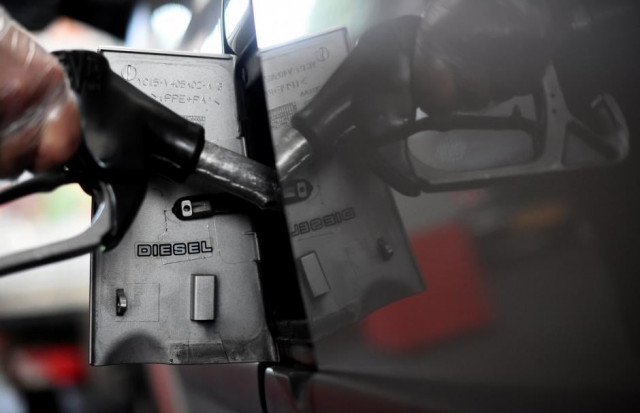Britain to ban new petrol and diesel cars from 2040
Effort to control air pollution spells victory for electric cars

A man refuels his car at a petrol station in London, Britain, July 26, 2017. PHOTO: REUTERS
Britain’s step, which follows France, amounts to a victory for electric cars that if copied globally could hit the wealth of oil producers, as well as transform car industry jobs and one of the icons of 20th Century capitalism: the automobile itself.
The mayors of Paris, Madrid, Mexico City and Athens have said they plan to ban diesel vehicles from city centres by 2025, while the French government also aims to end the sale of new gasoline and diesel vehicles by 2040.
Toyota to use Nvidia’s AI technology for self-driving cars
The British government has been under pressure to take steps to reduce air pollution after losing legal cases brought by campaign groups. Prime Minister Theresa May’s Conservatives had pledged to make “almost every car and van” zero-emission by 2050.
The ban would only apply to conventional rather than hybrid vehicles that have both an electric and combustion engine, Gove’s ministry said. However, there is a mountain to climb.
Electric cars currently account for less than 5% of new car registrations in Britain, with drivers concerned about the cost and limited availability of charging points and manufacturers worried about making expensive investments before the demand is there.
“We could undermine the UK’s successful automotive sector if we don’t allow enough time for the industry to adjust,” warned Mike Hawes, chief executive of the Society of Motor Manufacturers and Traders.
The future is electric?
While many automakers may find it hard to countenance the end of the combustion engine, some have embraced a future where electric vehicles, or perhaps even driverless ones, prevail. This month, Volvo became the first major traditional automaker to set a date for phasing out vehicles powered solely by the internal combustion engine by saying all its car models launched after 2019 would be electric or hybrids.
Renault-Nissan in 2009 announced plans to spend 4 billion euros on electric car development. But until Volkswagen (VW) admitted in 2015 to cheating on US diesel emissions tests, most mainstream auto manufacturers had been slow to sink serious investment into battery cars.
Billionaire Slim eyeing electric taxi to reduce pollution in Mexico City
The backlash against diesel, without which carmakers would struggle to meet CO2 targets, has since refocused minds and produced a flurry of new commitments.
In Europe, so called, ‘green cars’ benefit from subsidies, tax breaks and other perks, while combustion engines face mounting penalties including driving and parking restrictions. China, struggling with catastrophic pollution levels in major cities, is pushing plug-in vehicles, though in the United States there is much less appetite so far.
Germany, the home of major carmakers such as VW, Daimler and BMW, should soon start phasing out petrol and diesel too, said Oliver Wittke, a transport expert in Chancellor Angela Merkel’s Christian Democrats. But there is likely to be resistance in Europe’s biggest car market. More than 600,000 jobs could be at risk in Germany from a potential ban on combustion engine cars by 2030, the Ifo economic institute said this month in a study commissioned by Germany’s VDA car industry lobby.
Published in The Express Tribune, July 27th, 2017.
Like Business on Facebook, follow @TribuneBiz on Twitter to stay informed and join in the conversation.



















COMMENTS
Comments are moderated and generally will be posted if they are on-topic and not abusive.
For more information, please see our Comments FAQ